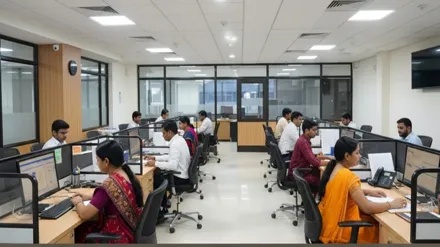
Government Initiates Paperless Service Record System for Central Employees
The Indian government has launched a transformative initiative to digitize employee records across all central ministries, mandating the use of e-Service Books starting 2025. This move marks a significant shift from traditional paper-based service records to a centralized digital platform known as e-HRMS 2.0. The reform aims to enhance transparency, streamline administrative processes, and ensure secure storage of employee data. By transitioning to a paperless system, the government seeks to address longstanding challenges such as data loss, accessibility issues, and inefficiencies in record management. The e-Service Book will serve as the official digital repository for all career-related information, including promotions, transfers, salary revisions, and pension details. This initiative aligns with the broader goals of the Digital India mission, ensuring that government operations become more efficient and accountable. Employees and departments will benefit from real-time access to records, reducing bureaucratic delays and improving service delivery.
Key Benefits of the Digital Transition
The implementation of e-Service Books offers multiple advantages for both employees and administrative bodies. For government workers, the digital platform ensures greater data security and eliminates the risks associated with physical documents, such as theft or damage. Employees will also gain the convenience of accessing their records remotely, which is particularly beneficial for those working in remote locations or requiring urgent information for career-related decisions. For departments, the transition reduces the administrative burden of managing physical files and accelerates processes such as promotions and transfers. The e-HRMS 2.0 portal will provide a unified system for tracking employee performance, ensuring compliance with regulations, and maintaining accurate records. This shift not only enhances operational efficiency but also supports the government’s commitment to modernizing public services through technology.
Government Directives for Implementation
The Department of Personnel and Training (DoPT) has issued clear instructions to all central ministries and departments to complete the transition by 2025. Key directives include digitizing all employee records, verifying data accuracy, and phasing out physical service books. The e-Service Book will be recognized as the official record, replacing traditional paper formats. This requires departments to invest in training and infrastructure to ensure seamless adoption of the new system. The government has emphasized the importance of data verification to prevent discrepancies and ensure the integrity of employee records. By mandating this transition, the government aims to create a unified digital ecosystem that supports transparency and accountability. The initiative also aligns with broader efforts to modernize public administration, making it more responsive to the needs of employees and citizens alike.
Recent Reforms Affecting Government Employees
Alongside the e-Service Book initiative, the government has introduced several other measures to improve the welfare of employees and pensioners. The Central Government Health Scheme (CGHS) has been reformed to include more private hospitals and enhance cashless treatment facilities for pensioners, providing greater healthcare access. Employees in certain central services now have the option to switch from the New Pension Scheme (NPS) to the Old Pension Scheme (OPS) in cases of death or permanent disability, strengthening pension security. Additionally, the Dearness Allowance (DA) for central employees was recently increased by 2%, raising the current rate to 48% to counter inflation. These measures, combined with the upcoming 8th Pay Commission, signal the government’s focus on improving employee benefits and financial stability. The 8th Pay Commission, expected in 2025-26, could bring significant changes to salary structures and allowances, further enhancing the livelihoods of government workers.
Future Outlook and Strategic Implications
The transition to a digital service record system represents a pivotal step in modernizing government operations. By adopting e-Service Books, the government not only addresses immediate administrative challenges but also sets a precedent for future reforms. The integration of e-HRMS 2.0 into existing systems will create a more efficient and transparent framework for managing employee data, which is critical for maintaining accountability and service quality. The reforms also reflect the government’s commitment to aligning with global trends in digital governance, ensuring that public services remain responsive and adaptable. As the 8th Pay Commission and other measures take effect, the focus on employee welfare and pension security will continue to shape the trajectory of government policies. This comprehensive approach underscores the importance of technological innovation in enhancing the efficiency and fairness of public administration.




